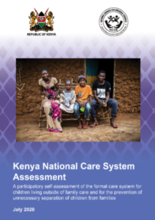Executive Summary
The government of Kenya is committed to moving away from institutional care towards family and communitybased care. This is in line with international and national child rights instruments and informed by a growing evidence-based illustrating the benefits of family-based care on children’s development and the potential negative impacts of residential care. Kenya has made important strides and achieved key milestones over the past two decades in relation to children’s care and protection. Beginning in 2001, when the Children’s Act (referred hereafter as “The Act”) came into place. The Act includes important provisions related to children’s right to care including parental responsibility, fostering, adoption, custody, maintenance, guardianship, care and protection of children. To support the oversight and implementation of the contents of the Children’s Act, Kenya has established the National Council for Children’s Services (NCCS) as the policy-making, coordination, regulatory, advocacy and advisory body and the Department of Children’s Services (DCS) the mandated government body to implement children’s services, including care.
The care system assessment is intended to support the Government of Kenya to assess and strengthen the national, formal care system. More specifically, the objectives of the care system assessment framework are to: 1) support the State Department of Social Protection through the National Council of Children Services and the Department of Children Services to lead an inclusive and participatory self-assessment of their national care system; 2) support country-level care reform stakeholders to build consensus on sector priorities and actions to advance the national care system; 3) provide information for government agencies and other stakeholders in care reform to use to develop policy documents/guidance, national care reform strategies and/or action plans; and 4) set a baseline to track progress of strengthening national care systems over time.
The assessment framework follows a system approach. This means that the assessment considers national policies and guidelines, the social service workforce, services provided, monitoring and evaluation, social norms and financing across the spectrum of prevention and alternative family-based care options. The original assessment framework was developed by Changing the Way We Care (CTWWC) 16 with the intent for each country to adapt based on the local context and priorities.
The assessment took an approach of a “participatory self-assessment.” Where the stakeholders involved in the care system responded to the assessment questions together and, through dialogue, the assessment team built consensus on responses, priority interventions and next steps. The Care Reform Core Team driven by the National Council of Children Services, doubled up as the assessment team because of their core function to develop the care reform strategy. A series of meetings with the Care Reform Core Team17 were conducted prior to the assessment workshop. The Core Team’s focus prior to the assessment was on customization of the assessment framework and questions to ensure that the assessment speaks to the local realities and the Kenyan context. The Core Team then planned for a three-day assessment workshop in November 2019.
The assessment findings presented in this report have captured the thirteen sections of alternative care options and relevant care reform thematic areas as described in Guidelines for Alternative Family Care for Children in Kenya (2014) (AFC Guidelines). In addition, the assessment covered topics that cut across all areas of care. This is described as “Cross-Cutting Areas” and the findings apply to most or all of the areas of alternative care and care reform.
Overall, the assessment findings and recommendations were reviewed and validated by the Care Reform Core Team. Over a period of three months, the refinement of the findings and recommendations by 15 members from the core team was made possible through in-person and virtual meetings. The intention is for NCCS to use the finding to develop the Kenya National Care Reform Strategy and also for NCCS partners to identify high priority actions in care reform agenda in Kenya.

